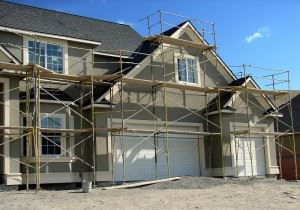 If your home has an attached garage, you’ve no doubt been enjoying the convenience and comfort that comes with being able to end a winter drive by getting out into a room that’s relatively warm and protected from the elements. Your car stays cleaner as well, protected from dirt, snow, and from birds dropping unwelcome presents.
If your home has an attached garage, you’ve no doubt been enjoying the convenience and comfort that comes with being able to end a winter drive by getting out into a room that’s relatively warm and protected from the elements. Your car stays cleaner as well, protected from dirt, snow, and from birds dropping unwelcome presents.
Unfortunately, a home that has an attached garage is almost always a home in which air quality is lower than it should be and the occupants are breathing more carbon monoxide than they should be. We’ve talking in the past about the dangers of CO poisoning and how important it is to maintain a functioning CO detector in your home.
Here are some tips to avoid dangerous carbon monoxide issues that so often originate in attached garages.
Never Warm Up Your Car Inside the Garage!
The single biggest thing you can do to make sure that carbon monoxide levels never reach a dangerous level in your home is to never warm your car up by letting it run while you sit in the garage. This is true even if you have the garage door open! An Iowa State study found that warming a vehicle up in a garage with the door open for as little as two minutes raised the concentration of CO in the garage to 500 ppm – and there was a still a measurable concentration of CO present ten hours after the car exited the garage!
Never allowing your car to run while sitting in the garage is the best way to avoid CO problems. Here are some other steps you can take which can help keep the air quality in the rest of your home as pristine as possible:
- Seal the wall between the garage and the house to eliminate the presence of any cracks or holes. This can also help keep heating energy loss to a minimum if your garage isn’t heated.
- Install an exhaust fan of sufficient size to ventilate the garage. This can lower the pressure in the garage and be effective in preventing CO from entering the house – ask R.S. Andrews about installation of fans or vents!
An Argument Against Attached Garages
If you’re in the market for a new house in the Atlanta area, or are building a new house or just considering adding a garage to your existing house, you may want to avoid an attached garage altogether. Despite the convenience and protection from the elements an attached garage can offer, you’ll be dealing with an almost certain loss of air quality from carbon monoxide leakage, as well as higher energy bills brought on by the difficulty in heating and cooling an attached garage and keeping in properly insulated.
An open carport or garage that is detached from the house are your best bets for air quality, and since winter is mercifully short in this part of the country, you may find the money you saved on heating bills makes up having to step out into the cold when you need to use your car.
If you have any questions about carbon monoxide prevention and detection or about insulating your attached garage, give us a call today!

